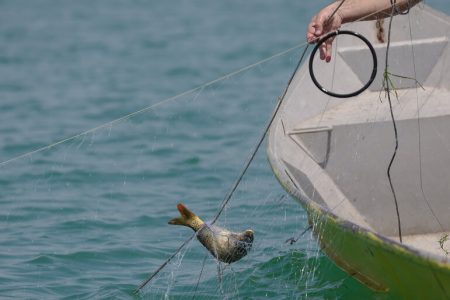Carp was once the “King of Lake Shkodër”. Found in abundance in the largest inland body of water in the Balkan Peninsula, carp was a lifeline for fishers and their communities for generations. The lake, situated on the border of Albania and Montenegro, was also the home of birds, eels, freshwater snails and several fish species. The lake’s communities were fishing communities and until recently, people always thought of themselves as fishers.
“In the past ten years, the situation has dramatically changed,” says local fisher Azem Plisi. “The lake is not as productive as it was.”
Lakeshore development, pollution, climate change and overfishing have taken a heavy toll on the lake’s biodiversity, including carp and other fish stocks, and that’s affected the lives and livelihoods of those who depend on them.
“Sometimes we thought of abandoning fishing altogether,” says Musa Hysa, another fisher who has felt the impact of these changes first-hand.
Now around 420 fishers are taking part in an FAO initiative, implemented together with Albania’s Ministry of Agriculture and Rural Development, a local fishery management organization and non-governmental organisations (NGOs), to improve sustainable fishing practices and rebuild breeding stocks by using aquaculture-based practices.
This is part of FAO’s AdriaMed Project, which is funded by the Italian Ministry of Agriculture, Food and Forestry Policies. It promotes scientific and institutional cooperation among nations on the Adriatic and Mediterranean Seas and seeks to improve the regional management of fishing and aquaculture activities.
Before 1990, freshwater aquaculture was common on the Albanian side of the lake. Fishers used to practise restocking and rely on several hatcheries for juvenile fish production. In recent years, as hatcheries disappeared, fishers saw a worrying decrease in the lake’s fish stocks.
Illegal and excessive fishing added to the fishers’ losses, and people were forced to move elsewhere or find other ways to earn an income in order to survive.
“We had a hard time because of the decline in fish stocks, as well as catches and profitability,” says Gezim Lezja, a fisher who heads the local fishery organization. “Restocking practices were almost forgotten.”
Revitalizing Lake Shkodër
Drawing on the community’s heritage, the Albanian project helped to share with young fishers the breeding techniques used by experienced fishers. During the reproduction season in April 2022, FAO experts worked with fishers to build temporary net enclosures to support egg deposition for the breeding of carp.
Carp broodstock were collected for breeding and transferred to the enclosures for induced spawning, a common method where adult fish in captivity are stimulated with natural hormones to release eggs. The eggs, protected in the net enclosures, hatch into fish larvae which later become juveniles. In the final phase the young fish, big enough to ensure a good rate of survival, were released into the lake in June 2022.
“We have been working with fishers to recover their traditions and use them to support sustainable practices while building opportunities that creates jobs, protect the environment and support livelihoods in the long-term,” says Nicoletta Milone, FAO fisheries officer.
The AdriaMed project also includes plans to establish a hatchery to produce a reliable and sufficient supply of fish fingerlings and ensure long-term sustainability on Lake Shkodër.
Tom Miraku, Executive Director of FAO’s implementing NGO partner, Hydra, says the initiative is already making a difference to fishers.
“This pilot was a trial to test its feasibility. Now we have all the elements to start with planning and implementation,” Miraku says. “We have worked together and with small steps we can transform our lives.”
“We are trying to preserve our history and keep our identity as a fishing community strong. In the long term, this process will show fishers the way forward for the production of a good quantity of fry and fingerlings each year.”
Roland Kristo, Deputy Minister of Albania’s Ministry of Agriculture and Rural Development, who is in charge of fisheries and aquaculture, says the project has already delivered results and that the lake’s fisheries will have a future.
“We strongly believe that with good cooperation and the involvement of all the actors, we can achieve the sustainable development of our fisheries and ensure the proper management of our resources,” Kristo says.
Arben Kipi, FAO Assistant Representative in Albania, says this initiative also plays an important role in reducing poverty, as it improves fisher livelihoods by generating more stable income.
The AdriaMed project initiative celebrates the International Year of Artisanal Fisheries and Aquaculture (IYAFA 2022) which recognizes and supports the contribution of small-scale artisanal fisheries and aquaculture to sustainable development, and more specifically, to food security and nutrition, poverty eradication and the use of natural resources.
The initiative is part of FAO’s commitment to Blue Transformation, aimed at developing a sustainable and profitable fisheries and aquaculture sector that will create jobs, while protecting the environment and keeping heritage alive.

